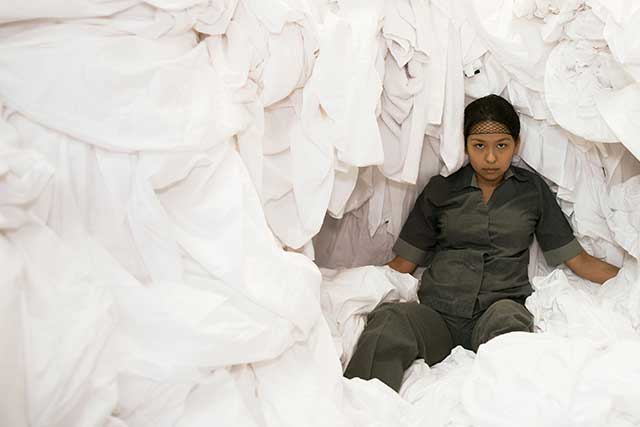As anyone who's occupied the position could tell you, the role of hotel chambermaid involves a lot of menial labour: if you find changing your own duvet cover the most rotten of chores, imagine having to do it fifty or so times a day, seven days a week, for precious little thanks, and not much more money. The job also, however, bestows a funny sort of privilege: the opportunity to pass at will behind locked doors, and thereby see how the other half live. (Less so if you're working in a Travelodge, but even so, there are levels of access.) The idea of hotel as hierarchy sustains The Chambermaid, a drolly impressive first film from the writer-director Lila Avilés, which never leaves the chi-chi corridors and functional backchannels of a plush Mexico City establishment, and in doing so sets a rich, self-contained universe before us. Heroine Evelia (the quietly mischievous Gabriela Cartol) is a disruptor, a 24-year-old indigenous woman who's learnt to use the invisibility bestowed on her by her housekeeping gig - the invisibility that sees guests stripping naked in her presence, or paying her no heed whatsoever - to take a few liberties here and there: rifling through bins to glean the odd discarded item for herself, carving out pockets of that same leisure time the hotel's clientele have booked themselves in for. In Avilés' conception, Evelia's something like a fixer in a prison-camp movie: we spend much of the film's running time wondering how much this young woman can make off and get away with.
The movie's strengths are observational: it notices Evelia, dares to give her an inner life, considers how she might spend her days. Phonecalls snatched between room services sketch in the nature of the heroine's emotional ties - just who she's doing this work for - and we gradually gain a sense of the small hopes she guards for herself. She has an eye on a red dress someone's handed into lost and found and, beyond that, on a promotion to the hotel's prestigious 42nd floor suites; she takes in-house classes with the aim of obtaining her GED, although she will make credibly haphazard progress on that front. It's a film that not only understands what it is to scrape by - Eve's colleagues endeavour to drum up a few extra bucks here and there via the sale of Avon-like moisturisers or fidget spinners - but has some element of that scraping folded into its very form. Avilés offers us thin slivers of scenes that, over The Chambermaid's 100 minutes, build up to provide a more complete picture of this woman's work. Some of these scenes are cursory: there are a few blunt interactions with a local celebrity who proves every bit as rude and thoughtless as you fear celebrities who check themselves into five-star hotels would be. Others are more surprising, sight gags that - through repetition and variation - becomes appreciable running jokes, like Eve's growing closeness with a window cleaner who's developed a crush on her. Crucially, Avilés never gives into the drudgery of this workplace; instead, she skips down these corridors with the same curiosity as her heroine, aware that all life is here.
The Chambermaid wouldn't hold us as it does without its leading lady; it's a mini-masterstroke of casting. Cartol will almost certainly be the tiniest figure you chance upon on screen this week, but she's by far the most compelling with it: Avilés has such faith in her as a presence that she can set up a scene that involves no more or less than Evelia waiting for a lift - and then make both a joke and a small act of heroism out of it. The scene has a point: Eve's story, we gather, is one of great, unheralded patience and resilience - the patience and resilience that allows menial labourers to go back and deal with other people's not inconsiderable shit, day in, day out. Cartol does a lot with the downturned gaze that's been drilled into this character, yet she demonstrates such irrepressible spirit whenever Eve is left to her own devices - when she feels she's not being watched - that we can't help but root for her to get her due; Avilés bestows an additional grace upon her in those scenes that find this minion looking out, through the vast windows of the hotel's penthouse suites, onto a world in which she would appear to play such a small part. Those set-ups are as about as widescreen as The Chambermaid gets, but the fact Avilés isn't pushing for some vast tableau means Eve comes into even clearer focus than the saintly housekeeper of Alfonso Cuarón's Roma. We believe this woman; we cheer for her, perhaps as her tentatively upward mobility mirrors our own, and worry whenever that progress is checked. By the final moments - with Avilés weighing up whether or not to give Evelia the release she deserves from this five-star prison - you may find yourself head over heels in love with her.
The Chambermaid is now playing in selected cinemas, and streaming via Curzon Home Cinema and the BFI.

No comments:
Post a Comment